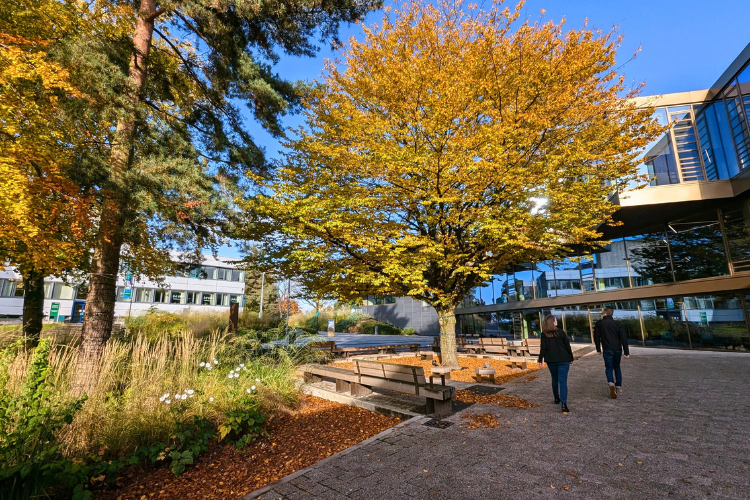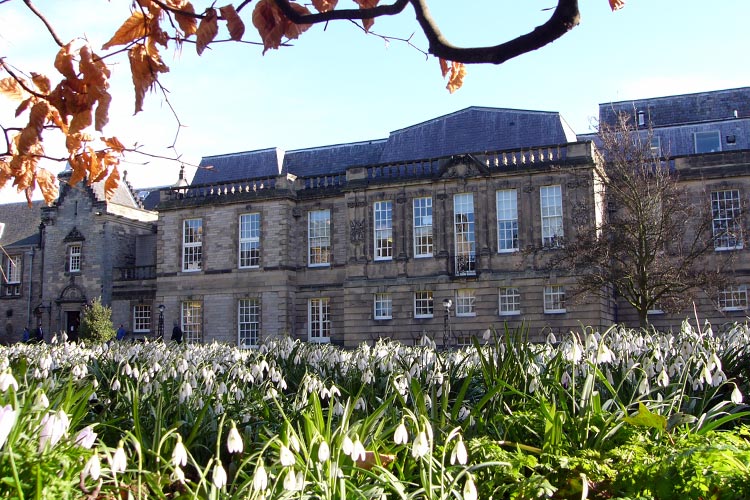Research impact
Through our research, the School of Psychology and Neuroscience aims to change our world for the better. Working with our collaborators across the University and across the world, from academia to governments, we influence the world around us in a number of ways.
Protecting great ape culture
From “Cultures in chimpanzees” (Nature, 1999) to “Population connectivity explains the distribution and complexity of chimpanzee cumulative culture (Science, 2004), a series of reports has confirmed that cultural traditions pervade the lives of chimpanzees. Chimpanzees appear to display the greatest diversity of traditions among nonhuman animals. Other researchers have built on this work to demonstrate culture in other primate and non-primate species. International conservation bodies have begun to incorporate these discoveries into conservation policies and practices.
Work by Professor Andrew Whiten focuses on the appointment within UNEP’s Convention on Migratory Species (CMS) of an expert group to advise on progress in these endeavours, leading to approval at a 2019 CMS CoP in India of a Concerted Action between three West African range states to conserve chimpanzee’s nutcracking cultures in this region, and building on this, approval at a 2024 CoP in Kazakhstan for a Concerted Action to conserve chimpanzee cultural diversity across 19 African range states. UNEP-CMS and the other major international conservation agency, the International Union for the Conservation of Nature (IUCN) are now collaborating in these missions.

Explaining crowd behaviour
Steve Reicher has applied his social identity model of crowd action to explain the 2011 English riots. A sense of shared identity, rooted in deprivation and a sense of police illegitimacy, underpinned the initial riot and explains where it spread. This was not a matter of mindless ‘copycat rioting’, but depended upon people seeing themselves in the events of Tottenham. The work has reshaped public order policing and is beginning to influence policy makers. Reicher was invited by Shadow Home Secretary Diane Abbott to address organisations and MPs in Parliament in March 2019.

Decolonising the curriculum
We are all aware of the need to address societal inequality, but many of us remain unaware of how these disparities have profoundly shaped the fields of Psychology and Neuroscience. Erin Robbins and Akira O’Connor’s groundbreaking book, Colonised Minds, unravels the ways in which societal power dynamics, colonial legacies, and cultural biases have influenced scientific research, theory, and practice in these fields. Through compelling narratives, the book highlights how scientific knowledge has both reinforced and been shaped by social inequalities, often perpetuating exclusionary perspectives and underrepresenting diverse voices. This work seeks to not only bring these often-overlooked histories to light but also to inspire meaningful discussions on how science can be more inclusive and equitable moving forward. They are now working with the public, scientific societies, and with educators to help bring this knowledge to a wider audience.

The origins of mind: opportunity for research engagement
The Living Links centre at Edinburgh Zoo is a pioneering research and education hub dedicated to understanding primate behaviour and evolution. Professor Andrew Whiten played a pivotal role in its foundation, establishing a facility that could advance research into the social and cognitive lives of primates while engaging the public in scientific discovery. Through interactive exhibits and live research demonstrations, Living Links, together with the Budongo Trail fosters public engagement by bridging the gap between cutting-edge science and the community. Visitors gain insights into primates' behaviours, inspiring curiosity and conservation awareness. The current Director, Professor Amanda Seed, continues this mission and has recently overseen a refurbishment of Living Links and expanded the accessibility of scientific research through the launch of citizen science activities.
Healthy competition
Regular physical activity is known for its positive impact on physical and mental well-being. However, busy lives often lead to physical inactivity, affecting approximately 37% of adults in high-income countries. To combat this, Professor James Ainge collaborates with colleagues Prof. Gozde Ozakinci (University of Stirling) & Dr Andrew Williams, School of Medicine to evaluate the impact of the Step Count Challenge, designed by charity Paths for All. This workplace program encourages teams of colleagues to compete by tracking their activities. By combining teamwork and competition, the challenge motivates participants to increase their physical activity levels, with research showing significant improvements. As this project continues to develop the team will determine the challenge's impact on cognitive benefits.

Are humans unique?
Although thinkers from Aristotle to Darwin have theorised about what makes humans unique throughout history, research happening at the University of St Andrews means we can begin to see commonalities between humans and animals that may have gone unnoticed in the past. Working with the University Museums Team, Manon Schweinfurth created a temporary exhibition at the Wardlaw Museum to show how animals co-operate with each other, show cultural differences, communicate in complex ways, make tools and can even read our minds. The exhibition asked visitors to consider the impact of their actions on non-human animals – and to think about ways to advocate for them. Whether that be through campaigning, adapting a diet, or supporting a worthwhile cause, visitors are encouraged to lend their voice to the issues that non-human animals face – all while exploring the incredible emotional and cognitive abilities that exist in the animal kingdom. With credit to Lateral North for the photograph.

Nature and Wellbeing
Barbara Dritschel and Rachel Gibson, are researching the effects that mindfulness and nature have on our wellbeing within the university and the wider community. A link has been established between anxiety and depression with rumination levels, and higher levels of rumination can lead to longer episodes of depression. Both mindfulness and time spent in nature have been found to reduce rumination, and therefore both are treatment options for people suffering with ruminative thinking. This research offers an insight into therapy options for the wider community. Specifically, the effects of mindfulness and nature-based mindfulness are compared, in order to understand if there is a combined impact on reducing rumination, when the two aspects are working together. This work aims to guide future research, as well as the development of wellbeing interventions.

Supporting Impact
Our School aims to embed impact into our research and teaching promoting the application of our findings to a broader audience. We deliver a 4th year module to our students on the Impact of Science and offer impact-related projects in our capstone project modules. Staff are given opportunities to discuss and develop their research impact through small group workshops with the Director of Impact and Innovation or members of the University’s Research Impact Team, and individual meetings. We hold impact events such as talks from relevant agencies such as St Andrews Innovation and support early career researchers in impactful work through funding opportunities and meetings. We revise our impact strategy annually and produce an Impact and Innovation Strategic Plan

